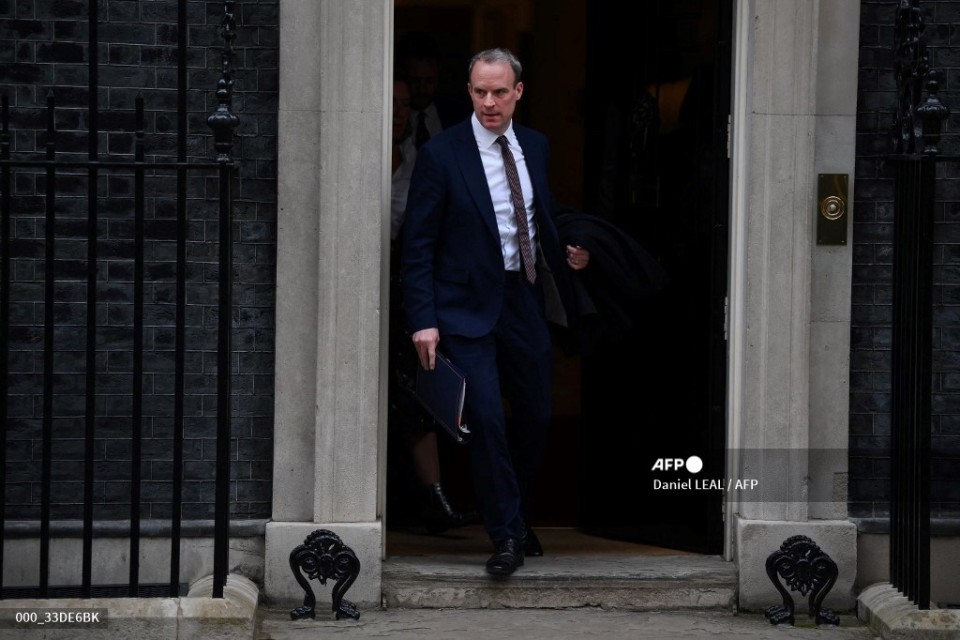
by Phil HAZLEWOOD
Dominic Raab announced he was stepping down on Friday as UK deputy prime minister after being faulted in a workplace bullying inquiry, dealing a fresh blow to the beleaguered Conservatives.
The resignation presents a headache for Prime Minister Rishi Sunak, who had pledged a fresh start after his predecessors’ turbulent tenures, some two weeks before local elections at which the Tories are expected to lose seats.
Sunak is also battling to claw back a chasm of lost ground to the main opposition Labour party before a general election next year.
Raab, who stood in for former prime minister Boris Johnson as he battled Covid in 2020, had promised to quit if any claims against him were upheld.
The report’s author Adam Tolley concluded Raab “acted in a way which was intimidating” at a meeting while foreign secretary and by threatening a civil servant with “unspecified disciplinary action”.
At the justice ministry, he was at times “abrasive” but not “abusive”, the report’s author added.
Even though he was cleared of all but two of the eight allegations against him, he blasted the conclusions of a lawyer-led inquiry launched last November.
In a lengthy riposte in the Daily Telegraph he described the six-month investigation as “Kafkaesque” and a trial by media “fuelled by warped and fabricated accounts”.
– Low bar –
In his resignation letter, Raab called the two findings against him “flawed” and said they “set a dangerous precedent for the conduct of good government”.
The bar for bullying was set so low, he said, that “it will encourage spurious complaints against ministers and have a chilling effect on those driving change”.
Raab also resigned from his post as justice secretary, where he has notably had to battle a backlog in criminal cases caused by years of under-funding and disruptions caused by the pandemic.
He previously served as Brexit minister and foreign secretary but was moved from that post after being criticised for failing to return from holiday as Afghanistan fell to the Taliban.
Sunak — who succeeded the short-lived Liz Truss in October last year — vowed to restore “integrity, professionalism and accountability” in government after Johnson’s rollercoaster tenure.
The prime minister said he accepted his resignation “with great sadness”, praising his record in government and for promising to resign if any of the complaints were upheld.
He replaced Raab at justice with lawyer Alex Chalk, and made Oliver Dowden deputy prime minister.
Labour’s deputy leader Angela Rayner accused Sunak of weakness, for not sacking Raab before he quit.
Sunak previously sacked Nadhim Zahawi as Conservative party chairman over his tax affairs.
Gavin Williamson, a former defence secretary who kept a tarantula on his desk while in charge of party discipline in parliament, quit over expletive-laden messages.
– Fight-back –
Former lawyer Raab, a karate black belt, has denied bullying civil servants working for him during his time at the Brexit ministry, foreign office and Ministry of Justice.
He rejected allegations of an overbearing manner with colleagues, insisting that ministers “must be able to exercise direct oversight with respect to senior officials over critical negotiations conducted on behalf of the British people”.
Not to do so, he said, would mean the loss of “the democratic and constitutional principle of ministerial responsibility”.
He also maintained ministers “must be able to give direct critical feedback on briefings and submissions to senior officials in order to set the standards and drive the reform the public expect of us”.
“Of course this must be done within reasonable bounds,” he went on.
Tolley said there was “no persuasive evidence” that Raab shouted at civil servants or swore, and there was “no sound basis” he was vindictive or used physical gestures in a threatening way.
No one told Raab — who described himself as “demanding, driven and focused on detail” — that his communications with civil servants at the three ministries could amount to bullying, he said.
But Tolley said he could have realised it was a possible issue, as senior officials raised his management style with him.
Raab said he was “genuinely sorry for any unintended stress or offence that any officials felt”.
But he maintained the public had a high expectation of ministers working on their behalf.
© Agence France-Presse







